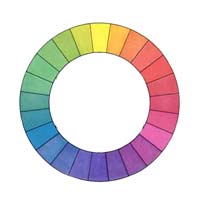| Glossary Of Art Terms
[32] |
C
Call for Entry A call for entry is a formal invitation or announcement issued by an organization, institution, gallery, or competition organizer to solicit submissions of artwork, proposals, or projects for consideration in an upcoming exhibition, event, or creative opportunity. Calls for entry typically specify the theme, criteria, and submission guidelines for prospective participants, including deadlines, entry fees (if applicable), format requirements, and selection criteria.
Artists, designers, and creatives may respond to calls for entry by submitting portfolios, images, descriptions, or proposals of their work for review and consideration by a jury, panel of judges, or selection committee. Calls for entry serve as a means of promoting artistic engagement, fostering community participation, and providing opportunities for emerging and established artists to showcase their talents, gain exposure, and contribute to the cultural dialogue within their respective fields of practice. |
| Calligraphy A style of typography (written) art that results in decorative and beautiful images forms from words and letters. Calligraphy artists must be highly skilled in order to layout words as art in a harmonious and elegant manner. |
 |
| Camera-ready Copy Any digital or digitized artwork that is ready for print as per the specifics of the process being used for reproduction. These files may also be called "finished art" or "reproduction copy". |
Canon In the arts and humanities, a canon refers to a set of authoritative works, texts, or standards that are considered exemplary or foundational within a particular field, discipline, tradition, or cultural context. The canon may encompass literary classics, artistic masterpieces, philosophical treatises, musical compositions, religious scriptures, or other forms of cultural expression that have achieved enduring significance, influence, and recognition over time. The concept of the canon reflects evolving notions of cultural value, aesthetic merit, and historical relevance, shaped by factors such as cultural heritage, educational curricula, critical scholarship, and societal norms.
While the canon has traditionally reflected the perspectives and priorities of dominant social groups and cultural institutions, it has also been subject to criticism, revision, and diversification to include voices, perspectives, and narratives that have been marginalized, excluded, or underrepresented within mainstream discourse. As a dynamic and contested concept, the canon continues to evolve in response to changing attitudes, values, and interpretations within the broader landscape of cultural production and reception. |
Canvas A heavy-duty, tightly woven fabric; rolls of specialty canvas are used in inkjet prints to produce Giclée canvas prints. After they are printed, the canvas is treated with a protective coating that guards against scratching, and dust and water damage.
Order online:
Mounted Artist Canvas
Rolled Artist Canvas |
 |
| Caricature A form of visual satire, in which a figure - usually a recognizable person - is depicted with exaggerated or distorted features, similar to a cartoon reproduction |
Cartography Cartography is the art and science of creating maps, charts, and geographic representations of the Earth's surface, terrain, and spatial relationships. Dating back to ancient civilizations such as Mesopotamia, Egypt, and Greece, cartography has played a pivotal role in human history, exploration, navigation, and territorial governance, providing essential tools and visualizations for understanding the world and its diverse landscapes.
Cartographers employ various techniques and technologies, including surveying, aerial photography, satellite imagery, geographic information systems (GIS), and digital mapping software, to collect, analyze, and represent geographical data in a systematic and accurate manner. From topographic maps and nautical charts to thematic maps and interactive atlases, cartography serves diverse purposes in fields such as geography, urban planning, environmental science, transportation, archaeology, and disaster management, facilitating spatial analysis, decision-making, and communication of information across different scales and contexts. |
Carve To carve is to sculpt or cut into a material, such as wood, stone, metal, or clay, using tools and techniques to create three-dimensional forms, textures, and patterns. Carving is a versatile and ancient artistic practice that has been employed by cultures around the world for thousands of years, producing objects of utility, ritual significance, and aesthetic beauty. Carving techniques vary depending on the material being worked, as well as the desired outcome and artistic style.
Common carving tools include chisels, gouges, knives, saws, and rasps, which are used to remove material gradually and shape it into desired forms. From intricate woodcarvings adorning furniture and architectural details to monumental stone sculptures gracing public squares and temples, carving encompasses a wide range of artistic expressions and traditions, reflecting the skill, craftsmanship, and cultural heritage of the artisans who practice this time-honored craft. |
| Casein Named for the milk protein that is used to make it, casein is a water-based, water soluble paint that dries quickly. It has been used since Egyptian times. |
| Cassatt, Mary An American painter (1844 – 1926) who spent most of her life in France and worked primarily in the Impressionism genre, with much of her subject matter depicting women and children |
| Cezanne, Paul A French painter (1839–1906) who is widely considered one of the founders of the Post-Impressionist painting genre. |
| Chine collé A printmaking method. The image is transferred onto thin paper or fabric with some translucency. The image is then mounted onto a hard surface, creating a different background color than the original image. |
| Chromogenic color print A traditional photo printing technique in which color dyes are created by chemical reactions. Three main dye layers are used: magenta, cyan, and yellow. The prints are produced from color negatives or slides. |
| CMYK A common color mode term used by graphic artists and print technicians. CMYK stands for Cyan, Magenta, Yellow, Black, and identifies the color cartridges commonly used in ink jet printers. |
Coated paper Refers to any paper that has been treated on the surface to achieve a specific quality: a shine or gloss finish, extra stiffness, texture or altered ink absorbency.
Commonly used for photographic printing, these papers have a coating of clay or another thin compound, and will be classed as "dull, matte, gloss, or cast. |
| Collagraphy Collagraphy uses various materials glued to rigid wood or paperboard to create a surface with many diverse textures. Ink is applied to this surface (either the raised or recessed sections)and pressed onto the paper to create the print. |
| Color balance In printing, the term "color balance" relates to the amount of primary colors (Red, Green, Blue, or Cyan, Magenta, Yellow, Black) required to mix and recreate the colors of the image |
| Color blanks When printing text on images, color blanks may be created as proofs, which reproduce the images but not the type or lettering. Also referred to as "shells". |
| Color break When a print is created using multiple colors, the color break is the point at which one color stops and another begins. May also be called a "break for color". |
| Color field painting A painting technique that is identified by large areas of solid color on the canvas, generally with no tonal contrasts or specific areas of focus. |
Color gamut In color reproduction, including computer graphics and photography, the gamut, or color gamut (pronounced /ˈɡæmət/), is a certain complete subset of colors. Most commonly, this phrase refers to the subset of colors which can be accurately represented by a certain output device.
Another meaning, less frequently used but no less correct, refers to the complete set of colors found within an image at a given time. In this context, digitizing a photograph, converting a digitized image to a different color space, or outputting it to a medium using a certain output device will most likely alter its gamut, losing some of the colors, tints, or shades in the process.
|
| Color shift Refers to changes in the color of an image across a single print, due to density of the ink or the grain of the applied color dots. |
| Color Triangle The primary colors arranged in a triangle, with one color at each corner. The additive color results are then blended within the rest of the triangle. For example: blue bleeding into yellow between those two corners, and yellow bleeding into red between those two colors. |
| Color Wheel Identifies the primary, secondary and tertiary colors and their relation to one another. More detailed color wheels show possible shades of each color, when mixed with varying amounts of white. |
 |
| Colour wheel An abstract illustrative organization of color hues around a circle, which shows the relationships between primary colors, secondary colors, tertiary colors etc. |
| Combine Another collage-like art technique, combines use various objects to construct artworks on traditional surfaces, such as canvas. |
| Complementary colours A pair of colors that produce black when combined (or in the case of colored light, white). Placed side by side, this pair creates the greatest possible contract between the colors. Complementary color pairs in the RGB model: red and cyan; yellow and blue; magenta and green. |
| Composition The layout or arrangement of an artwork. The artist "composes" the work by determining where the visual elements should lie within the viewing space. Different arrangements, such as the main subject close to the viewer, or moved far back in the scene, lend different moods to the finished work. |
| Comprehensive Dummy In printing, a proof that is fully assembled, with all typography, images, and colors. May also be called a color comprehensive. |
| Conceptual art A genre of visual art that focuses more on the process, theories, and ideas behind creating the artwork or installation than on the finished piece itself. For instance, Marcel Duchamp's Readymades, or Eric Cameron's layered paint objects. |
| Cornea The cornea is the transparent, dome-shaped outermost layer of the eye that covers the iris, pupil, and anterior chamber, and plays a crucial role in focusing light onto the retina for vision. In laser engraving and ophthalmic surgery, the cornea is a critical anatomical structure that requires precise treatment and protection to maintain visual acuity and eye health. Laser technologies such as LASIK (Laser-Assisted In Situ Keratomileusis) utilize focused laser beams to reshape the cornea and correct refractive errors such as nearsightedness, farsightedness, and astigmatism. Laser engraving systems equipped with advanced optics and safety features ensure accurate and controlled delivery of laser energy to the cornea, resulting in safe and effective vision correction procedures with minimal risk of complications or tissue damage. |
Crop marks Crop marks are small dashes, usually in black or gray ink, which appear at each corner of a printed image to indicate where the paper should be cut.
They are most commonly used when a white border - the same color as the paper - will be included around the cropped image. |
|
© 2002-2026 - KeenART Media Ltd.
|
|
| |
|

